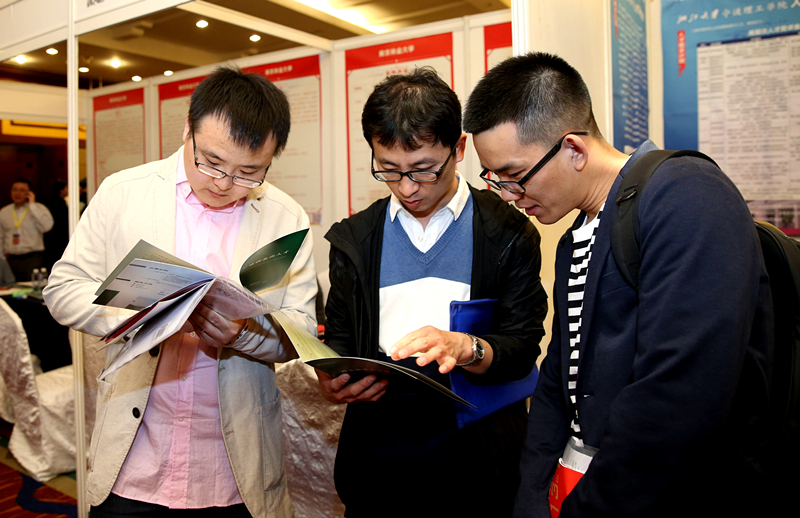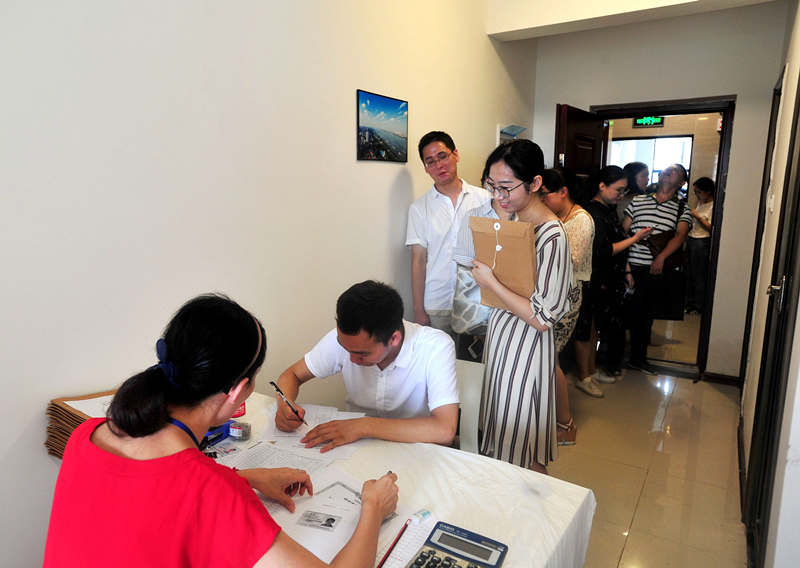Free hukou fails to seal the deal in talent search
Priority access to household registration is no longer a major concern when new graduates are choosing a place to live and work.
Priority access to household registration is no longer a major concern when new graduates are choosing a place to live and work.

As competition to attract talent has intensified between major cities in recent years, many have unveiled packages to lure ambitious young people. However, permanent household registration, one of the key incentives offered by many cities, appears to be losing its appeal.
For six decades, obtaining permanent residency, or hukou, has been essential for people hoping to settle in major cities.
Chinese nationals are registered with the hukou system in their place of birth, and it can be extremely difficult to amend registration to a different location.
However, people are always keen to make the change because hukou grants access to social benefits, cuts the cost of local healthcare services and provides easier access to local schools for the holder's children.
Basically, getting the right hukou makes life a lot more convenient.
For the 20 or so large cities that have released policies to land fresh talent, particularly graduates, the idea of offering hukou with little to no requirement regarding employment or property ownership was an obvious one.
But evidence suggests that hukou is no longer a priority for the younger generation when choosing a place to settle or launch a career.
Career development
A survey conducted last year by China Youth Daily found that the top three factors for university graduates were: salary (64 percent); potential career development (59 percent); and the size of the city (43 percent). Hukou ranked fourth in the list of concerns.
Chengdu, capital of Sichuan province, is one of the cities to have implemented a talent recruitment campaign. In addition to offering hukou, the city provides free temporary accommodation for graduate job seekers and free trips to a well-known panda-breeding research base in the province.

Yet when it came to decision time, Chengdu native Peng Bowen opted to move to Beijing rather than stay in his hometown.
The 25-year-old, who left the University of Electronic Science and Technology of China in Chengdu this year with a master's degree in communication technology, will soon begin work as an algorithm engineer for Pony.ai, a startup that specializes in self-driving technologies. He will earn about 400,000 yuan ($62,600) a year before tax.
Peng rejected job offers from three other leading tech companies, including Google.
"My priority is the job," he said. "I'm deeply interested in AI and self-driving technologies, and Beijing has the most startups in these fields, where I can work with many excellent people. The decent salary in this sector is also quite attractive."
In June, Deng Lingyu turned down the chance of obtaining hukou in Fuzhou, the capital of his native Fujian province, to take a job with a Shanghai law firm because the 27-year-old law graduate felt it would allow him to learn from a better group of attorneys.
"In my second week, I was assigned to draft a legal document in English under the guidance of my mentor, an experienced lawyer. I don't think I would have had such a chance in a smaller city," said Deng, who studied at East China University of Political Science and Law in Shanghai.
At present, he does not qualify for permanent residence in Shanghai, and his parents have tried to convince him to work in Fuzhou and move his there from his home city.
"They think it's a serious issue, but I don't worry about it much," he said. "Without hukou, I can still enjoy many social resources. At this point in my career gaining experience is the most important thing. I can always leave if I'm not happy."
Zhu Qing, director of the student career guidance center at the University of International Business and Economics in Beijing, said hukou has clearly begun to lose its appeal among new graduates.
A recent survey conducted by the center showed that only 18 percent of respondents regarded hukou as the top consideration when looking for a job.
Graduates will not stay in a city just for hukou because career development and job opportunities are the top two overriding factors, Zhu said. He estimates that about 80 percent of his university's graduates find jobs in Beijing, Shanghai, Guangzhou or Shenzhen (both in Guangdong province), but up to 65 percent stay in Beijing.
The survey also indicated that 67 percent of students pay close attention to talent incentives, and 52 percent would be willing to work in their hometowns if suitable opportunities arose.
"The incentives attract their attention because working in one's hometown is much better than being in an unfamiliar city," Zhu said, adding that it's important for local governments to know what graduates really need when they are choosing a city to work in.
However, a new problem - "empty hukou" - has arisen as cities have lowered their requirements. "We found that many graduates who work in Beijing without hukou often register in smaller cities nearby. As a result, what those cities have attracted is just a batch of hukou registrations, not real talent," he said.
A government researcher, who did not want to be identified because of the sensitivity of the topic, said some local governments may have an ulterior motive for attracting talent and use the campaigns to boost the real estate market.
Zhou Xiaofan, deputy director of the Beijing Human Resources Association, said young people will help to boost local housing prices because even if they can't find a well-paid job they are the only child in their family so their parents and grandparents dote on them and will buy them an apartment.
Experts advise cities that are genuinely looking to make an impact on the talent market to diversify.
Sun Rui, a researcher at the Chinese Academy of Personnel Science, which is affiliated to the Ministry of Human Resources and Social Security, said talent incentives provided by local governments no longer have distinct characteristics, and most of the cities are offering similar inducements.
Providing a platform
Sun added that talent introduction works via many stages, and cities first need to introduce talented people with investment plans and projects to provide an employment platform for young graduates.
As an example, he cited Wuhan, capital of Hubei province, which has the highest number of university students and the highest outflow of graduates in China. The city has appealed to its best-qualified alumni to return and start businesses or invest in local companies, which will provide more employment opportunities.

In April last year, Wuhan launched its Talent Introduction Bureau and hired entrepreneurs who graduated from the city's universities as counselors, including Lei Jun, CEO of Xiaomi. In addition, the bureau has found roles for a large number of Chinese experts along with six Nobel laureates from overseas, including cell biologist Randy Schekman and chemist Karl Barry Sharpless, both United States nationals.
Between June 2017 and last month, about 500,000 new and recent graduates arrived to work in Wuhan, double the number for the same period the year before. About 200,000 of them registered for hukou, which was six times the number for the same period in 2016.
"We carefully analyzed the kind of talent we need, based on Wuhan's competitive industries," said Sun Zhijun, the bureau's deputy director, referring to sectors such as electronics, chemicals and medical equipment.
Cut-price apartments are among the incentives the city is offering to returning graduates. Those who buy a government-built property are eligible to a reduction of 20 percent off the market price, but Sun conceded that a lottery system has been introduced because demand has far outstripped supply.
Wang Meifang, a student majoring in translation of English and Chinese at Wuhan University who will graduate next year, said more graduates from her college have chosen to stay in Wuhan in the past two years.
"Cities are giving young people more options, which is a good thing. For me, finding a job I like is my primary consideration," she said.

